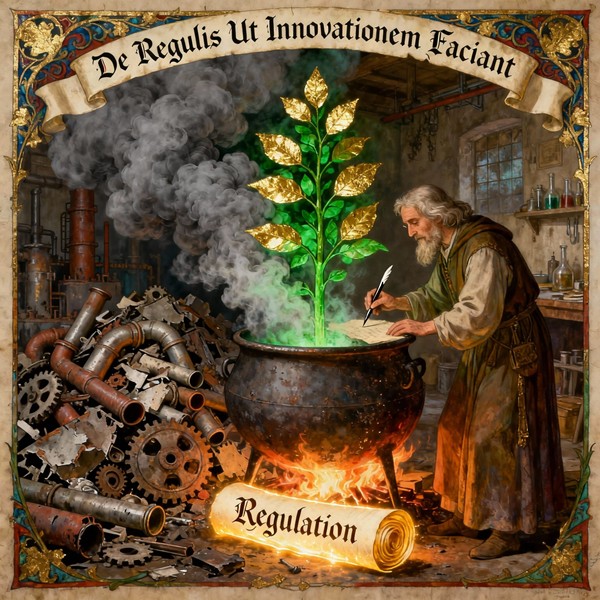Debunking Myths and Exploring Opportunities
Leading Sustainability and Regeneration in Projects
SERIES ARTICLE
By Dr. Hugo Minney
United Kingdom

Figure 1 The alchemy of the Porter Hypothesis
Abstract
We challenge the long-standing misconception that environmental regulations are a drag on economic growth. We argue that modern, well-designed environmental policies can catalyse innovation, and through this can create competitive advantage. By leveraging evidence from decades of OECD analysis and real-world case studies, we demonstrate the cost of failure to implement and enforce regulations at a national and international level. We also show the risks – and very real costs – for companies and government organisations by ignoring the medium and long-term impact of environmentally detrimental practices. We show that the “Pollution Halo Effect” creates long-term value, and we debunk the “grow now, clean later” fallacy. For project professionals, this reframing is a call to action: to move beyond a defensive, compliance-based mindset and become strategic leaders who turn regulatory constraints into opportunities for sustainable and regenerative growth.
Keywords: Economic Growth, Sustainability, Regeneration, Environmental Regulations, Porter Hypothesis, Pollution Haven, Pollution Halo, Project Management, Innovation.
The growth imperative and its perceived discontents
Project managers and industry leaders seem to work under the assumption that continuous growth, as measured by Gross Domestic Product (GDP), is the sole path to societal progress and prosperity (Minney 2025c). Project mandates embed this assumption, justified as they are by revenue generation or increased GDP. The previous articles (Minney 2025a, 2025b, 2025c) explored alternative frameworks to redefine success beyond mere financial returns, focusing on quality of life. For example, a transition to a service-based economy and to experience-based consumption can generate economic growth (measured in happiness or other quality-of-life markers (NZ Treasury 2021; Social Progress Imperative 2024)) without consuming finite resources or producing pollution.
In this article, we examine the belief that environmental regulations are a burden that hinders growth. We explain why this belief came about (it was true of the types of environmental regulations at the time) and put forward evidence that modern policies and regulations are catalysts that drive innovation, enhance efficiency, and create new economic opportunities and competitive advantage. We demonstrate that project managers who understand the dynamic relationship between regulation and economic activity, can move beyond a defensive, compliance-based mindset to a proactive, strategic one.
More…
To read entire report, click here
Editor’s note: The author Dr. Hugo Minney is a Fellow of APM (Association for Project Management), a Member of PMI and PMI UK, Co-Chair of APM’s Benefits and Value SIG, and committee member of PMI UK’s Sustainability Community of Action. For more, see his author profile at the end of this article.
How to cite this work: Minney, H. (2025). The Impact of Environmental Regulations on Economic Growth: Debunking Myths and Exploring Opportunities, Leading Sustainability and Regeneration in Projects, series article, PM World Journal, Volume XIV, Issue X, October. Available online at https://pmworldlibrary.net/wp-content/uploads/2025/10/pmwj157-Oct2025-Minney-Env-Reg-Econ-Grow-Sustainability-4.pdf
About the Author

Dr Hugo Minney
London, UK
![]()
Dr. Hugo Minney is a Fellow of APM (Association for Project Management), a Member of PMI and PMI UK, Co-Chair of APM’s Benefits and Value SIG and committee member of PMI UK’s Sustainability Community of Action (none of which are paid).
Minney set out to become a farmer but was defeated by bureaucracy. He sold high ticket computer systems and specialist software for workforce planning; joined the National Health Service for 18 years (and as a Chief Executive for the last 7 of these) and is now a project management consultant with a sideline chairing a charity restoring the sense of community for young people.
Minney works in project management, and in particular benefits management, motivating team members by reporting what they are achieving together and changing the community and culture to want to achieve – together. At present, he’s more involved on the governance side, accredited as a Social Value practitioner and Chartered Project Professional, and reviewing the balance of projects and contribution to objectives and benefits across portfolios.
Dr. Minney can be contacted at hugo.minney@thesocialreturnco.org
To view previous works by Hugo Minney, visit his author showcase in the PM World Library at https://pmworldlibrary.net/authors/dr-hugo-minney/









